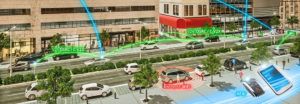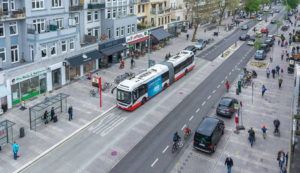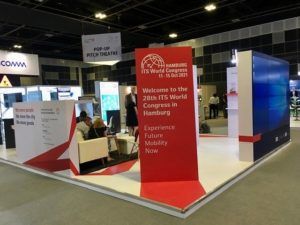The City of Hamburg has signed a partnership agreement with Continental on the development of new urban mobility technologies during this week’s ITS World Congress in Singapore, as part of the German city’s preparations to host the event in 2021.
With the USA hosting the next World Congress in Los Angeles in 2020, Hamburg and automotive technology supplier Continental have two years to work on joint ITS projects that aim to improve the safety of vulnerable road users and make more efficient use of parking spaces. The city already has 60 projects in the pipeline as part of Senate’s ITS strategy through to 2030. Continental has had close links with Hamburg since it acquired the Phoenix plant in the Harburg district in 2004. The company recently built a state-of-the-art innovation center in the city where new concepts and technologies for the industry of tomorrow will be produced in the future. Continental has also forged close partnerships with Hamburg Innovation, Tutech Innovation GmbH, and the main organization responsible for business development in Hamburg.
 Among the envisaged projects is a plan to improve road safety. This involves a collision warning system to protect particularly vulnerable road users. Using mobile edge computing, a cloud-based calculation of potential collisions with road users such as cyclists, pedestrians and e-scooter users is to be carried out at accident ‘black-spot’ crossings in Hamburg and a warning message sent wirelessly in potentially dangerous situations. The ‘mobile edge’ approach drastically reduces response time on the network (latency) and enables road users to communicate with each other via the cloud almost in real-time.
Among the envisaged projects is a plan to improve road safety. This involves a collision warning system to protect particularly vulnerable road users. Using mobile edge computing, a cloud-based calculation of potential collisions with road users such as cyclists, pedestrians and e-scooter users is to be carried out at accident ‘black-spot’ crossings in Hamburg and a warning message sent wirelessly in potentially dangerous situations. The ‘mobile edge’ approach drastically reduces response time on the network (latency) and enables road users to communicate with each other via the cloud almost in real-time.
Another area of cooperation envisaged is more efficient use of parking spaces, which is one of the biggest, yet least optimized, fields in urban environments. Motorists in Hamburg spend an average of 10 minutes searching for a parking space, which accounts for 30-40% of inner-city traffic while creating significant emissions of pollutants. The partnership will seek to make the management of the parking facilities available in Hamburg more efficient. Various solutions, such as the sensor-based, in-vehicle detection of available parking spaces, navigation to the nearest parking space or paying for parking spaces both on and off the street, will be examined and implemented if feasible. No infrastructure-related measures are required. Electric vehicle (EV) charging stations, parking spaces for disabled people or other special user group attributes could also be identified by this service.
“We are delighted that more and more technology companies are opting for Hamburg as an innovation location to shape the mobility of the future,” said Michael Westhagemann, Hamburg senator for economic affairs, transport and innovation. “Continental is a key partner in the deployment of intelligent transport systems with whose expertise we aim to test out new solutions for improved safety, greater efficiency and reduced emissions.”





